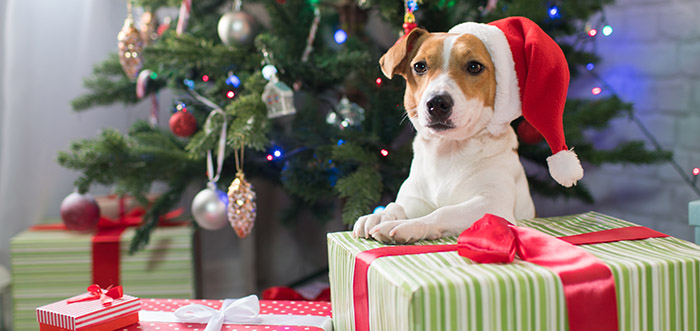Research commissioned by Natures Menu and The Leadership Factor revealed that while more than 80% of owners admit to buying a gift for pets for Christmas, it’s important that pet owners know what to look out for or keep out of reach.
From poisonous chocolate, toxic Christmas tree water and turkey with all the trimmings, the celebrations can present many hidden dangers to pets. Raw and natural pet food experts, True Instinct, reveals its top 10 hazards for our furry-friends and how to avoid them:
Christmas tree water
If you opt for a real Christmas tree this year, be aware that it could prove a hazard to your pet. Christmas trees are considered to be mildly toxic with the fir tree oils being irritating to the mouth and stomach. However, the water the tree sits in can be even more poisonous, so make sure they don’t mistake it for their drinking bowl and ensure the pot is covered at all times.
Chocolate
Even a small amount of chocolate can be toxic to pets, so it should be avoided at all costs. The chemical theobromine, which is similar to caffeine can cause agitation, tremors, convulsions and even problems with the heart. Alcoholic chocolate smells even sweeter and can have serious side effects. There have even been cases of dogs vomiting chocolates and suffering from a hangover the next day!
Christmas dinner
While it might be tempting to feed your dog some turkey and stuffing over the festive season, treating them to rich human foods can cause a painful condition known as pancreatitis, which requires immediate veterinary treatment.
Leftover cooked turkey bones can also prove an irresistible treat for many pets but are considered very dangerous due to their brittle nature and the risk of splintering, causing serious damage to the digestive tract. Make sure all left overs are kept well out of reach and put in a heavy bin that cannot be easily broken into by an inquisitive pet!
Christmas decorations
Decorations made of plastic, paper or foil are of low toxicity, but may cause serious damage or blockages in the digestive tract, so therefore pose a serious risk if chewed or swallowed. Fairy lights and any other electrical wires can result in electrocution if chewed, so keep them out of reach of canines and felines.
Silica gel
Found in the packaging of new toys, bags, clothes, cameras or electrical equipment, which we may unwrap over Christmas, silica gel comes in small sachets and is used to keep items dry. Although labelled ‘Do not eat’ for humans, the same applies for pets as it is highly toxic.
Christmas pudding and mince pies
Dried vine fruits such as currants, sultanas and raisins pose a danger to four-legged friends and even just a small quantity can cause severe kidney failure. Make sure you keep the mince pies and Christmas puddings out of paws reach.
Christmas plants
Christmas plants such as poinsettia, holly, mistletoe and ivy are all poisonous plants and can cause irritation to the mouth, resulting in an upset stomach and vomiting. The ivy used in wreaths and decorations are often of the Hedera species and when there is prolonged skin contact, it can lead to irritation.
Batteries
There are always lots of presents under the Christmas tree requiring batteries and to a dog they may look like a treat for them to eat. If digested, batteries can cause burns to a pooch’s mouth and throat, along with damage to their digestive tract, so ensure you do not leave any lying around the house.
Candles
Lit candles can make a room feel cosy, however we need to be cautious as pets are attracted to bright lights in a darkened room. Candles should always be kept out of reach of pets and you should never leave your dog or cat in a room alone with a lit candle to prevent accidental knocking over from wagging tails and jumping cats, wax burns or fires.
Fires
We all enjoy a roaring fire when the temperatures drop outside and so do our pets, however both open and gas fires can give pets serious burns. To avoid your cat or dog getting too close to the heat source, be sure to place a fire guard around it for safety. Some dogs have even been known to accidently throw new toys into fires after getting overexcited or wagging tails to close to the heat source, singeing fur and burning the skin. It’s also worth checking your pet isn’t lying too close to the heat as it can easily burn through their thick fur to their skin causing pain and blistering which isn’t easily spotted by owners.
Melanie Sainsbury, veterinary educational Manager at Natures Menu, said: “While there may be increased hazards for pets during Christmas, canines and felines are very much a part of the family and we should try to include them in the festivities where possible. Why not buy them a small gift such as their favourite treat, so they don’t feel left out?
“It’s important to remember that, while the festive season is very exciting for humans, with family and friends visiting, loud noises and unfamiliar items and events, pets can get stressed and agitated leading to confusion and worry for them. To avoid this, create a suitable hiding spot or provide them with their own quiet room or space, ultimately giving them a safe haven to retreat to.”


